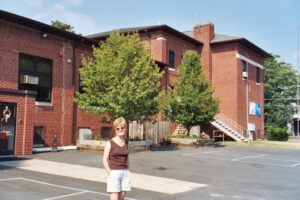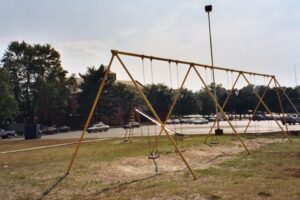
Greetings, readers. Today, we’re time-traveling to a 1960’s sixth grade rebellion. Long ago, this story was included in an early draft of Undertow, but got cut because it was a detour from the flow of the main story. So, now it’s landed in my blog-post series, “The Kitchen Sink.”
That phrase comes from this: it may seem as if I included everything about my life in my memoir, Undertow, except the kitchen sink!
The following is about growing up and the growing pains we all face. What happened, though, left a particular imprint on me that came in handy years later when I realized I had to escape the cult.
You can find links to those other Kitchen Sink stories at the end.
Because this story ends the way it does, you’ll see why I’m publishing it now.
The setting: St. Francis de Sales Catholic School in Salisbury, Maryland, my hometown. 1963.
Sixth Grade Rebellion
By Charlene L. Edge
Our town had one Catholic school and my parents paid tuition to place me in the hands of the highly rated, competent, super-duper disciplinarians and educational instructors of the order of the Sisters of Mercy who taught there. I owe much to the eight long years of solid academic training they gave me. I also owe much to a valuable trait a classmate imprinted on my character.
In sixth grade, one day on the school playground, my friend Jimmy sped around playing tag football, while I fought it out in a girl’s dodge ball game. We were in sixth grade. We had donned sweaters and ran around to stay warm in the cool weather. Fall had begun, and the leafy trees circling the yard had begun to turn the colors of fall—purple, gold, and brownish red. When the games broke up, we mingled around deciding what to do next. In the general hubbub, Jimmy passed by me, and I said something to him, maybe about an upcoming dinner with our families, and he said something back.

By this time in our growth spurts we were peering into the caldron of adolescence. Pubic hairs were faint but sprouting; breasts formed in preteen cotton bras; unpredictable hormonal fits and starts erupted; and our teacher, Sister Mary Geraldine, by God, knew the dangers of pre-adolescence that abounded in her classroom. Trouble with a capital “T” also loomed on the playground under the innocent blue sky, and she must do everything in her power to conduct a preemptive strike.
Before Jimmy and I realized it, there she was. In her black nun’s outfit, Sister had planted her feet on the blacktop between us and was shouting in our ears, her arms flapping vehemently like a crow ready to swoop us up and carry us off. My friend, Lulu, later reported that she’d seen Sister run down the back steps with her eyes fixed on us. She must have seen our covert conversation from our classroom corner window.
In tones I’ll never forget, Sister Mary Geraldine proclaimed to everyone within earshot that Jimmy and I had no business talking to each other, but in all the commotion I couldn’t work out the reason for her interference. Jimmy did, though; he reminded me later. We’d just broken Sister Mary Geraldine’s recess rule: girls and boys were not to “fraternize on the playground.” Jimmy protested on our behalf, but Sister Mary Geraldine wouldn’t listen.
“The two of you,” she said, “will be punished after school for this. You hear me?”
We mumbled our dutiful answer: yes, we understood.
At three o’clock in front of Sister Mary Geraldine’s gleaming wooden desk, with her brass bell perched on the corner, we took our punishment.
Jimmy and I were like brother and sister, or at least cousins. Our families had lived next door to each other during our childhood until I was seven years old and my family moved across town. His mother and mine were best friends, and kept close ties despite the new distance. We shared many Sunday dinners and birthday parties. Our classmates knew that. The Salisbury Catholic community was small, so most everyone knew everyone else’s business. Everyone, it seemed, except Sister Mary Geraldine. She didn’t seem to realize that Jimmy and I were like family, or if she did, she did not care.
“Sit in the first two desks,” Sister said, pointing to the front row, “and clear them of everything but your paper and pens. Charlene, you’re to write one hundred times, ‘I will not talk to boys on the playground.’ Understand?”
“Yes, Sister.”
“Jimmy, you write, ‘I will not talk to girls on the playground,’ one hundred times. Is that clear?”
Jimmy answered in the affirmative using a much too loud voice. I stole a quick look at him for this and noticed him scowl above his pen as he hunched over his paper, his nose only inches above it, his long legs stretched out into the aisle. He looked like a circus clown crammed into a tiny car.
“Charlene, get started,” Sister barked. “The longer you wait, the longer it is before you can leave.” She jerked her head in a quick nod and pursed her lips. I started scribbling, my face down and feeling as if it were on fire. After I’d written a few lines I heard Jimmy mutter to himself. I stole another glance at him.
“Shoot,” he whispered as he crossed out some words, pressing hard on the paper.
He rubbed his crew cut as if bugs were crawling through it, shuffled his feet, shoved aside the paper, and slammed his pen on the desk.
“I’m not doing this,” he said, more to himself than to us. “This is stupid.” He’d said that louder and in a way that Sister Mary Geraldine would later describe as “shouting” when she telephoned his mother.
My mouth flew open. Jimmy had suddenly donned Superman’s cape, and I adored him for his courage. He crumbled his paper and threw it with perfect aim across the front of the room, landing it in the trash can by the door as if it were a basketball swishing through a hoop. Dumbstruck, I sat stock still waiting for Sister to yell. Boy, was he in trouble. But I wanted to stand up and cheer. I wanted to jump and shout, “Yeah, I’m not doing this, either. Jimmy, you’re my hero.” But I was too chicken.
Sister Mary Geraldine was flabbergasted too but for different reasons. Her eyes grew big like dark open pits. She shook her black-veiled head and stood up, clapping her hands for order while Jimmy wiggled his too-big-for-this-desk body out of it and grabbed his book-bag.
“Now you sit right back down, young man. Right now, Jimmy. Do you hear me?”
Jimmy didn’t stop. He stomped towards the door past his rumpled punishment paper in the bottom of the trashcan and kept walking.
She yelled after him, “You’ll be sorry for this, Jimmy. Come back here. I’m calling your mother.”
My hero did not come back. I ducked my head down and shoved my pen across the paper as fast as I could, afraid to stop, afraid of the Sister of Mercy whose shock and indignation shone like a burning bush. Later Jimmy told me he wasn’t sorry even when Sister did call his mother. And wonderfully he didn’t get in trouble at home, he said. He peered at me with his green eyes and said, “Mom told me sometimes things we thought were sins of disobedience are really just growth spurts.” He claimed his mother said this. I had my doubts. But there was no doubt we were growing up. We couldn’t help it.
Jimmy and his sixth-grade war of independence took on mythic proportions in later years, and lucky for me was stored like a charm in a coat pocket when I needed it. Meanwhile, our childhoods were fast slipping away; the impact of their loss unknowable to us. What child is capable of imagining that youth is running out? Soon, however, Jimmy and I, along with the entire grownup world, encountered a fraction of that reality, a terrible dark one that ruined our innocence. About two months after our punishment episode, on Friday, November 22, 1963, President John F. Kennedy was killed.
—END—
This past November was the 60th anniversary of President John F. Kennedy’s assassination. I remember that vividly, as many of you might, too. If you have access to the History Channel, they recently aired a six-part series on his life. Hoyt, my husband, and I watched it. We reflected again on the very serious, critical events that Kennedy had to deal with, like the Cuban missile crisis. I couldn’t help but wonder, what would have happened if we’d had a different sort of president then, like a guy with little understanding of international relations, a person with little to no self-restraint, a man with a temperament ill-suited for handling the gravity of that situation, lacking the ability to listen to wise counsel.
Other “Kitchen Sink” blog posts
The Kitchen Sink: The Catholic Girl Who Got Left Out | Charlene L. Edge (charleneedge.com)
The Kitchen Sink: Summer of ’65, the Nunnery | Charlene L. Edge (charleneedge.com)
The Kitchen Sink: Prisoner for a Day, 1972 | Charlene L. Edge (charleneedge.com)
Next blog post: a holiday greeting.
Thanks for reading!
Your writer on the wing,
Charlene







Peggy+Lantz
I never had Jimmy’s courage, either. But Tom Sawyer did: “I done it” he said, to save Becky from a whipping.
Kathleen Brandt
Good for Jimmy! He’s my hero, too.
Nylda Dieppa
A gripping story that grabbed me when you said “What happened, though, left a particular imprint on me that came in handy years later when I realized I had to escape the cult.” I am curious to learn how that worked out.
Charlene
this foreshadowed the time in Undertow when I got the courage to I quit the research team.
Charlene
correction/addition: the courage to quit the biblical research team at Way headquarters, then escape the next year for good. I just said no to The Way and got out. Jimmy’s walkout was a template for that.
Steve Muratore
I was in 4th grade on that fateful 11.22.63. Several years ago, I read Stephen King’s magnum opus with that date as its title. King exquisitely imagined what might happen in an alternate history, not altogether different from what you wondered.
I became a Stephen King fan as a result of reading that novel.
Charlene
Thanks for the King recommendation!